- Chemistry M.Sc
- Ireland, Dublin
- Trinity College Dublin (TCD), Trinity Biomedical Sciences Institute (TBSI)
- 04/2023 – 09/2023
Application and Preparation
I have thought about completing part of my studies abroad during my master’s degree in chemistry ever since the first semesters of my bachelor’s degree, and because Ireland has always been a very fascinating country to me that I have planned on visiting anyway, I chose Dublin as the place where I wanted to do a research internship. Additionally to the beautiful landscape and the friendly people I envisioned to encounter, Ireland has the advantage of being an English-speaking country with many excellent universities to choose from. During the master’s in chemistry at RWTH Aachen University, students are required to do several research internships in different groups and fields of chemistry, but we are free to select the location and the group, so I decided to do an internship in Ireland instead of a semester abroad where I have to take courses. Therefore, I began applying to different groups about six months before I wanted to start the internship, which is quite late in hindsight, and I would definitely recommend starting earlier. Unfortunately I had the experience that most professors did not answer when I directly applied with a CV and a letter of motivation via e‑mail, which is why I asked a professor from Aachen to help me out in this regard, and that ended up bei
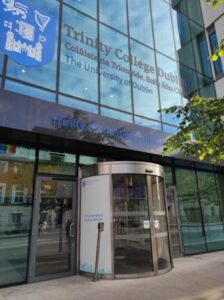
The Trinity Biomedical Science Institute – my workplace.
© Hannah Höche
ng the solution to my problems. After finding a group where I could complete my research internship and agreeing on the duration of the internship and the topic I would be working on, I started applying for Erasmus funding and filling out all necessary documents like the Traineeship Certificate. In addition, I applied for a leave of absence during that semester, which has to be done during the registration period for the following semester.
Accommodation and Living Situation in Dublin
Before I start explaining how I found an apartment in Dublin, I want to mention that this city is very, very expensive compared to Aachen and it is a real struggle to find an accommodation, which I was aware of before moving to Dublin, but the rent and the general cost of living is even higher than I would have expected. I would recommend starting to look for an accommodation as soon as possible, since a lot of apartments and rooms are listed for up to a year in advance, so even though I was searching for apartments where I could move in in April 2023, I saw a lot of offers for the following year. I used the popular websites daft.ie and let.ie, where you can also filter options like the number of rooms, the price or the duration of the rent. A lot of apartments and rooms can unfortunately only be rented for at least one year. I also looked up the location of the building I would be working in so I could find an accommodation reasonably near to be able to walk everywhere. In contrast to Germany, where you can use your semester ticket for public transportation, in Ireland you have to pay for every trip, but more on that later.
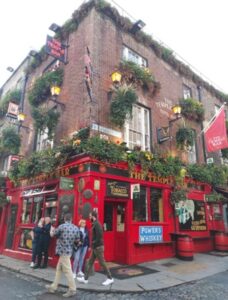
The Temple Bar.
© Hannah Höche
When finding a suitable apartment, I wrote to the landlord, but the reality is that they rarely answer, especially when the apartments have been uploaded to the websites for a few days. Therefore, I adapted my strategy and I searched for several times during a day to be able to immediately message the landlord when an apartment was uploaded – and I messaged a lot of people. It also helps to have a pre-written text where you only change the address. Sometimes they also offer online tours of the apartment, which is helpful when looking for apartments when still in Germany, but generally I had the experience that tours are in person. I also strongly advise to not just get an accommodation and transferring the money without having seen it and signing a contract, because there are rental scams in Dublin and even the websites of the different universities warn students to be careful. To be able to actually look for apartments and rooms, I would suggest to come to Ireland about one to two weeks before starting the internship or semester and then to actively go to apartment tours. I also prepared all the necessary documents so I could immediately express my interest in the accommodation. Generally, Dublin is divided into two areas by the river Liffey, and the south side is considered to be the “better” and safer area of Dublin. There are student accommodations, but they are also very expensive and generally hard to get, and my professor actually advised against trying to apply for the housing
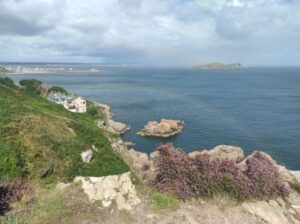
Howth, a peninsular village and outer suburb of Dublin.
© Hannah Höche
program and instead look for apartments.
In addition to the high rent, groceries and other necessities are more expensive than in Germany, so definitely try to save up beforehand. The public transportation also has to be considered, but you can save some money by getting the so-called TFI Leap Card, or the Leap Card for young adults in particular (aged 19 to 23). Although you can get pretty much everywhere by bus or the Luas, especially busses tend to be late and unreliable (at least outside of the city center). In this context, it has to be mentioned that tickets for the busses have to be bought from the bus driver when not using the Leap Card, and only coins are accepted.
Furthermore, I suggest checking with your insurance company whether you are insured for a stay abroad. Regarding phone calls, I just used my existing contract, there was no need to get a new one. Getting Wi-Fi for the apartment was a bit more tricky, because most internet contracts are only for at least a year, so I had to get a “pay as you go contract”, where you pay a certain amount every four weeks before you can use the internet, and I also had to buy a mobile router for that. You generally do not need to carry cash in Ireland (except for the bus as mentioned above), debit cards are widely accepted – if not everywhere. A lot of people also use Revolut (or sometimes PayPal). What I highly recommend is getting a credit card, because a lot of the tours I booked or sights I wanted to see could only be paid using a credit card. The bus companies that are driving to the airport (like Dublin Express or Aircoach) also only accept a credit card.
The Internship
I can honestly say that my research internship was one of the best experiences I had so far in a group. My professor Mathias Senge was a wonderful mentor and supervisor, who gave me my own project to work on and I learned a lot of skills that are useful and transferrable to any lab I will be working in in the future. My work day usually began at 9 am and ended at 5 or 6 pm and consisted of synthesizing my target compounds and purifying them, as well as literature research and the usual lab work. We also had regular meetings where we either presented our own research or papers from the literature we found interesting and helpful. I even got the opportunity to visit a conference and present some of my work in the form of a scientific poster. My colleagues in the lab were all incredibly nice and welcoming and helped me with any questions and problems. As for the requirements of the internship, I had to give an introductory talk and a final presentation for both my professor in Dublin and the professor supervising my internship from RWTH Aachen University, and I had to turn in a research report. In addition, I had to write monthly progress reports, but that was expected from my professor in Dublin and may not be a general requirement.
Free Time and Tips for Ireland
A lot of the Irish people I met told me that I have not really experienced Ireland if I only visit Dublin, and I can absolutely confirm that, Nevertheless, I want to start with some of the sights of the capital that I really enjoyed. Some of the museums in Dublin (The Dead Zoo, The National Gallery, The Archaeological Museum) are free of charge and definitely worth a visit. There are also several beautiful parks (Phoenix Park, St. Stephen’s Green, …) to enjoy, as well as distilleries that offer tours and tastings. Of course the popular tourist attractions like the Dublin Castle, Christ Church Cathedral or the
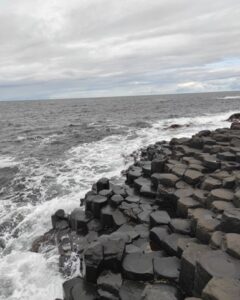
The Giant’s Causeway.
© Hannah Höche
Guinness Storehouse are also to mention, but they do cost money. A stroll through Temple Bar and along the river Liffey is also nice and free of cost. One of my favorite things was a visit to the Kilmainham Gaol, where I learned a lot about the history of Ireland – but tickets are very limited, so plan a visit 28 days beforehand to be able to get one (although there are sometimes returned tickets you might be able to get spontaneously). Lastly, a visit to any pub is pretty much a requirement and a lot of them have live music on the weekends, which makes a trip even more enjoyable.
Ireland has to offer such a wide variety of landscapes and nature spots, it is difficult to pick only a few. Not far from Dublin and reachable by the DART are Howth and Bray, where you can enjoy Cliff Walks and hiking trails. In order to comfortably travel, I recommend either the Irish Rail, bus services or booking trips from the popular tour operators, whereby the latter are quite expensive. Travelling by train is fairly straightforward and discounted tickets for students (a Young Adult Leap Card is necessary) are offered. The tickets can be bought online, but they have to be printed at the ticket machines at the train station (e.g. Heuston Station). Cities like Cork, Waterford and Killarney are easily reached via the train. Also, as a tip when visiting Cork, a little trip to Cobh, a seaport town and the last departure point of the Titanic, is absolutely recommended.
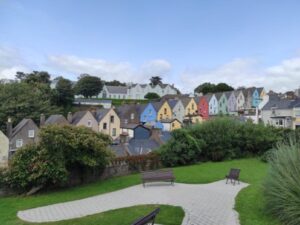
Cobh, a seaport town on the south coast of County Cork.
© Hannah Höche
In general, trips to Galway and the Cliffs of Moher, Kilkenny, Glendalough or even to Belfast and the Giant’s Causeway in Northern Ireland are an absolute highlight. The latter has to be one of the most beautiful spots I have seen, even though it is hard to pick a favorite. Even though a lot can be travelled by train or bus, some hiking trails or even cities and counties are unfortunately best reached by car.
Conclusion
I am incredibly grateful to have had the opportunity to spend a whole semester abroad completing a research internship. Not only could I acquire skills and knowledge in the laboratory and grow as a person and chemist, I got to make wonderful friends and see and visit the most beautiful spots I could imagine. My research internship taught me to work independently on my own project, which is very helpful as a preparation for both my master’s thesis and my aspiration to do a PhD. The only negative aspect about my stay abroad is the cost of living in Dublin, which would probably not have been possible for me to pay if I would not have had savings. Otherwise, I think it is an incredible experience to spend some time in another country and get to know the culture, and I would of course recommend Ireland as I really enjoyed my time there.


Leave a Reply